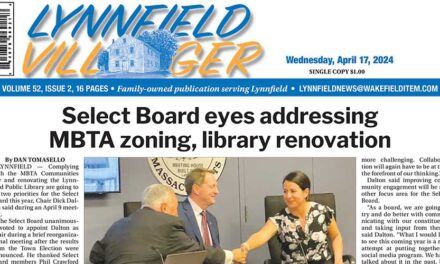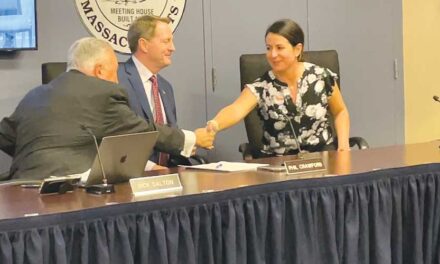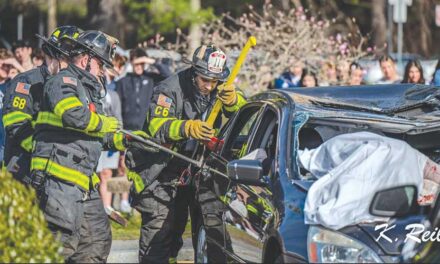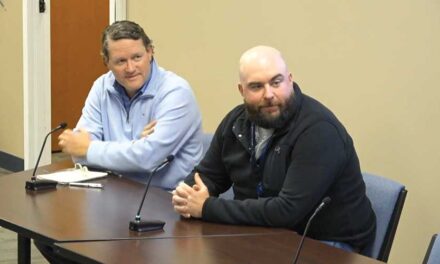By MAUREEN DOHERTY
LYNNFIELD — By a 3-0 vote, the Board of Selectmen will recommend passage of Article 9 when October Town Meeting convenes on Monday, Oct. 20 at 7:30 p.m. at the middle school. A quorum of 175 voters is required for the meeting to commence.
If successful, passage of the article will authorize the board to sell the seven acre Centre Farm and its historic buildings with deed restrictions attached to prevent it from being subdivided or significantly altered.
“I think we accomplished what we wanted to do with the purchase of that home and preserved the center of Lynnfield,” Selectmen Chairman Dave Nelson said at last Thursday’s board meeting. “I know there was a discussion of (holding onto it for) two years and this came before us in a short window. The town shouldn’t be in the business of selling real estate.” He added there would be a financial risk involved if the town waited two years to sell it.
Selectman Phil Crawford agreed that the deed restrictions made sense. “To make it a municipal property, we’d have to change it drastically, which is what we are trying to avoid,” Crawford said, adding that a forum held to discuss alternative uses for the property last month failed to generate a spark to get a viable use off the ground.
The original farmhouse was built in 1810 on land given to Rev. Joseph Mottey by the town in 1785 as part of his payment for being the town’s minister. It was expanded over the years and includes a large barn/carriage house with stables underneath.
During the special Town Meeting held June 30 to authorize the purchase from the Donovan family, the property was acclaimed for its superior craftsmanship which has enabled so much of its original features to remain in excellent working order over 200 years after it was built.
The dining room also contains rare, hand-painted wallpaper custom made in France in the mid-1800s depicting a foxhunt. Over 500 people voted in favor of purchasing the property for $1.4M plus $150,000 for ancillary upgrades to the heating and electrical systems. The town took ownership of the property on Oct. 3.
Town Administrator Bill Gustus and Town Counsel Tom Mullen also crafted both the request for proposals (RFP) required to be completed by any interested buyers and the deed restriction package that will run in perpetuity with the property and is recorded at the Registry of Deeds.
The successful bidder must meet the minimum purchase price paid by the town and agree to all of the restrictions. The RFPs are due Friday so the voters will know how much any buyer(s) would be willing to spend prior to voting.
Selectman Tom Terranova was satisfied that the deed restrictions addressed the concerns of townspeople who didn’t want to see two “McMansions popping up” on the property if it had been sold directly to a new owner by the Donovan trust. The deed restrictions prevent the two lots on either side of the home from being developed as separate single-family lots. The property has nearly 500 feet of frontage along Main Street. Terranova added that the deed restriction enables the Historical Commission “to have input on any construction that might happen to the property by the new owner.”
Other recommendations made by the selectmen included the following:
Article 8: Closure of Sparhawk Drive
By a 2-1 vote, the selectmen will not recommend passage of a citizens’ petition seeking the closure of Sparhawk Drive by residents of the road impacted by frequent U-turns and cut-through traffic from Walnut Street.
Nelson and Crawford voted against blocking the road, stating they felt it would push the problem down the street toward Bluejay Road or back out toward Salem Street. Both wanted the newly erected traffic restriction signs to be given time to work and noted the increased police presence was helping reduce truck violators.
Terranova said Sparhawk Drive is extremely wide, about 50-60 feet, which invites motorist to take quick U-turns. He said while standing under the signs with the petitioner, Bob Casoli, he observed many motorists simply ignore the signs and turn around anyway.
Article 10: The board voted 3-0 to support a $100,000 expenditure to cover the cost of repairing unforeseen pre-existing broken drainage pipes at the high school uncovered during excavation for the new $6.5M turf field project.
These pipes were 40-50 years old, some original to the school, and had to be repaired prior to the continuation of the subsurface work on the fields to prevent the need to dig up the turf field in the future and protect both the school building and the fields from damage.
Article 11: The selectmen will recommend voters support allowing the board to submit an application to the state Division of Conservation Services for a Parkland Acquisition Renovations for Communities (PARC) grant to redevelop Jordan Park.
If approved, the town could be eligible for up to a 56 percent reimbursement of the $740,800 cost of upgrades to Jordan Park. There is no risk to the town because if the grant is not received none of the money will be appropriated for the project. Crawford, who worked on the grant with Kevin McHugh, said if the town gets passed over this year they can reapply next year. The funds would be used to fix drainage problems and expand parking at Jordan Park from 38 spaces to 101 spaces to alleviate on-street parking congestion.
Articles 12 and 13: The board voted 3-0 to recommend passage of both articles that will close a loophole and prohibit both adult uses and medical marijuana facilities in the town’s Planned Village Development District (PVDD), and amend the existing Special Permits for Adult Uses by adding the sentence: “An adult use may only be located within the Commercial District within the town.”
Article 14: The selectmen unanimously endorsed passage of this article sponsored by the Planning Board that deletes Section 9.4 of the town’s Wireless Communications bylaw. It addresses advances in the technology available to wireless providers to have them use the least obtrusive facilities available that allows them to obtain their mandated coverage needs.
The new section of the bylaw would be known as “8. Special Permits, 8.7 Siting of Radio Telecommunications Facilities” and adds a new section under “7.4a Additional Requirements for Personal Wireless Service Facilities (PWSF).” Selectmen thanked the efforts of the Planning Board, in particular Alan Dresios, in drafting the proposal. The Planning Board is holding a public hearing on the changes tonight (Oct. 15) at Town Hall at 7 p.m.
Article 15: The recommendation to accept Pizzuti Way as a public way was deferred until Town Meeting since final sign-offs on paperwork were not ready Oct. 9.
Article 16: The selectmen unanimously endorsed amendments to the town’s bylaw on solicitors and canvassers drafted by Town Clerk Trudy Reid and Police Chief David Breen to enable licensing of both under the same requirements for peddlers and hawkers.
Town Administrator Bill Gustus said the motion will need to be amended on Town Meeting floor to reflect required exemptions for political and religious canvassers and those from nonprofits, such as students going door-to-door for fundraisers.
Article 17: The board will defer its recommendation on an amendment to the town’s general bylaws on dog licenses and fees until Monday night to address a question raised about the size of allowable dog kennels.
Article 18: The board deferred its recommendation on the Scenic Road bylaw after learning it may be indefinitely postponed by the sponsors, the Tree Committee.




